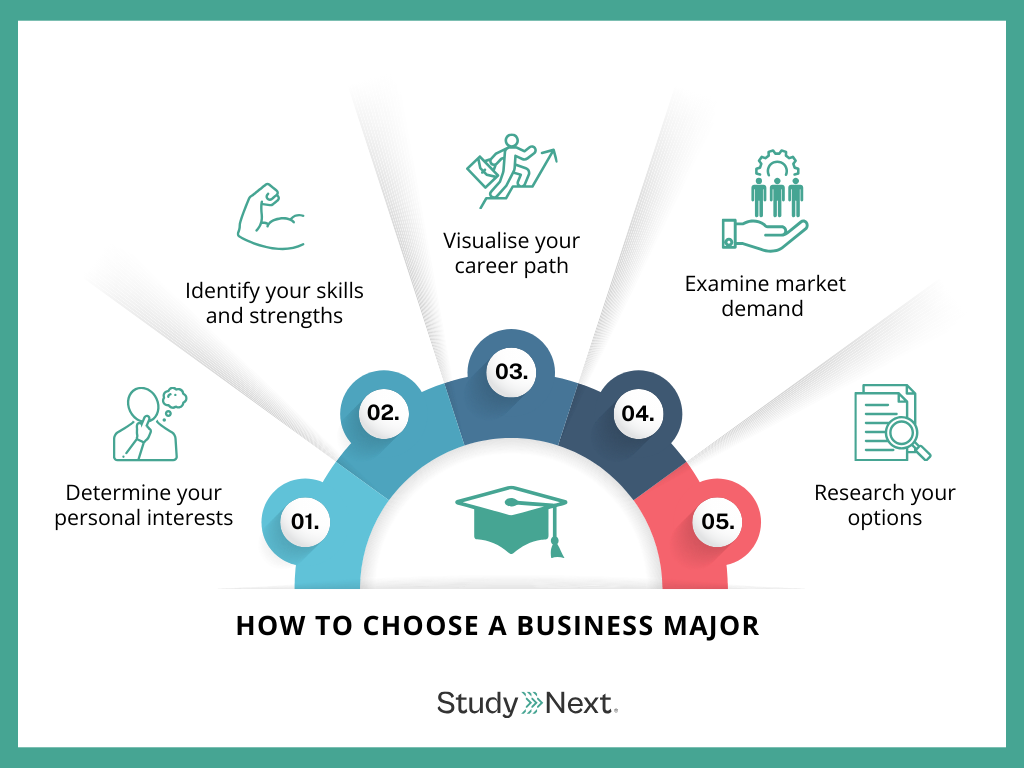
Building a rewarding career as a business professional often begins with selecting the right business major. For postgraduate students, focusing on a particular study area allows you to hone specialised expertise, unlock leadership opportunities and accelerate career growth. With a wide range of majors available, you can explore your options and choose a field that aligns with your professional goals.
Read this article to find out why you should consider pursuing a business major and how you can select the right one to lay the foundation for a successful career.
What is a business major?
A business major is an area of study at a higher education institution that focuses on business principles, practices and functions. Studying a major in this field allows you to delve deeper into a particular area of business like accounting, economics and entrepreneurship.
Throughout your studies, you’ll develop specialised skills in a particular area of business and a deep understanding of the core principles and practices within that field. For example, you’ll likely master financial reporting and forecasting when you major in finance. In a marketing major, you’ll typically learn how to conduct market research to understand consumer behaviour. Majoring in data analysis can equip you with industry-standard tools to analyse data and identify valuable insights and trends. This focused expertise will prepare you to become a highly skilled professional in your chosen area.
A business major ensures that you are well-prepared for a rewarding career path, whether you choose to work in a startup company, a large organisation or even as a freelancer. Your expertise can also help fast-track your journey to take on leadership roles within your field, giving you more authority and seniority to make a lasting impact on business performance.
How to choose a business major
Choosing a business major often begins with identifying your personal interests, skills and strengths. Visualising your ideal career path and assessing market demand can also help you determine which major suits you best. Take time to research and compare your options to find the right one that aligns with your long-term goals and aspirations. Learn more below:

-
Determine your personal interests
When you study a major that matches your interests, it can help make the learning experience more rewarding and help you build a career where you get to do what you enjoy for a living.
Understanding your personal interests can make it easier to select the right business major, as it helps you stay motivated and engaged with your studies. For example, if you enjoy creativity and communication, you could consider studying marketing. If you’re interested in problem-solving and working with data, a business analytics major might be a good fit. -
Identify your skills and strengths
When your skills align with your studies, it can be easier to understand the material and keep up with coursework. Start by listing your top skills and matching them with business majors that rely on these strengths. You can also take a career aptitude test to discover career paths that suit your strengths and use the results to narrow down your major options.
Recognising what you’re good at can play an important role in determining which business major is right for you. For instance, if you’re good at building and managing relationships, a human resources (HR) major may allow you to leverage your people skills. If you have strong analytical and numerical skills, finance could be a great choice. -
Visualise your career path
Mapping out what your ideal career path looks like can guide you in choosing the right business major to help you get started. If your goal is to become a business owner, for example, you could consider studying an entrepreneurship major to gain the knowledge and skills required to launch and grow a business.You can also research business major careers and their responsibilities to identify roles that appeal to you and learn what majors employers typically value the most. This can help you pick a major that aligns with both your ambitions and industry expectations.
-
Examine market demand
Analysing hiring trends across industries can also help you decide which field you want to study and pursue a career in. One way of doing this is by checking occupation shortage data from Jobs and Skills Australia to find out what jobs are currently in demand. For instance, sales and marketing managers were in national shortage in 2023 and continued to be in demand across several states the following year. This suggests strong job demand and growth potential, making these fields attractive for you to obtain a relevant qualification, as it can lead to plenty of career opportunities.However, it's important to remember that job trends can evolve over time. While considering job demand can be helpful, it shouldn’t be the sole factor in your decision.
-
Research your options
Exploring courses across various business majors can help you narrow down your options by examining the learning experiences they offer and how well their outcomes align with your career goals. With StudyNext Australia’s catalogue, you can browse and compare a wide range of courses, review core and elective units and check for practical opportunities such as internships and industry projects.Some accredited programs can also give you a direct pathway into professional organisations, which may boost your career prospects. For example, as a graduate of Deakin University’s Master of Human Resource Management course, you may be eligible for entry into the Australian Human Resources Institute (AHRI) Practising Certification Program, helping you improve your credibility within the HR field. By comparing your options, you can make an informed decision on which major to pursue.


Human resource (HR) policies and practices continue to evolve amid rising risks such as high turnover, low productivity, the increasing use of artificial intelligence and cybercrime. Deakin’s Master of Human Resource Management will help you develop up-to-date skills to implement contemporary HR strategies that have a high impact at both the individual and organisational levels.
Whether you’re working directly in human resource management (HRM) or general management with human resources development and management responsibilities, extend your skills and knowledge with this formal qualification.
Skilled professionals with contemporary HRM knowledge are integral to the functioning of every industry. The breadth and depth of HR roles have expanded the opportunities to impact staff wellbeing and retention while driving organisational change.
Accredited by the Australian Human Resources Institute, this specialised course is designed to enhance the qualifications of graduates in business, government and industry.
Undertake highly relevant units in the industry, including employment relations, human resource strategy, leadership and management development. You will enhance your existing employment experience and gain the knowledge and skills to progress to managerial-level positions in HR.
Complement your primary studies with a specialisation from a wide range of business-related fields. Designed to meet industry demand for skilled professionals with a breadth of transferable skills, a specialisation can help deepen your knowledge in a particular business field and benefit your future career.
Why study a business major?
Studying a business major offers numerous advantages, such as elevating your business knowledge, developing transferable skills, expanding your career opportunities, leveraging strong market demand and boosting your salary potential. You also have diverse study options to pursue a business major. Find out more below:
Enhance your business knowledge: A business major deepens your understanding of a specific business area. For example, if you aspire to lead teams and projects, a project management major can help you build the skills you need.
Gain transferable skills: Besides technical knowledge, business majors typically equip you with essential soft skills like leadership, problem-solving and strategic thinking. These transferable skills are highly valued across industries, offering you the flexibility to excel in a variety of roles and sectors.
Expand your career opportunities: Studying a business major opens the door to a broad range of career pathways in your chosen field. This allows you to advance your career in an area that matches your interests and long-term ambitions.
Benefit from strong market demand: Many business roles remain in high demand in Australia. For example, SEEK projects a 16.3 per cent growth for HR manager roles within the next five years, providing stable and promising career prospects for those majoring in HR.
Increase your earning potential: Business majors, particularly at the postgraduate level, can significantly increase their salary outcomes. According to the Graduate Outcomes Survey, business and management professionals with a postgraduate coursework qualification in Australia earned a median annual salary of $120,000 in 2023, while those with an undergraduate degree earned $69,200.
Get access to diverse study options: Australia offers a wide range of course levels for business majors, such as graduate certificates, graduate diplomas and master's degrees. With many programs offering flexible options like part-time study and online learning, you can customise your studies to fit seamlessly around your lifestyle.
Is a business major worth it?
Yes, a business major is generally worth it as it opens doors to a wide range of in-demand career opportunities. A business major equips you with a strong understanding of how organisations operate while also building specialised skills that can be applied in your preferred industry. Whether you’re a recent graduate or a working professional looking to expand your skill set, a business major can help you advance to the next stage of your professional journey.
In-demand business majors to boost your career prospects
Majoring in a specific area can help enhance your chances of building a career in a high-demand industry like finance, digital marketing, business analytics or data analytics. These fields are experiencing strong growth due to factors like ongoing workforce shortages, shifting market dynamics and rapid technological developments. Concentrating your studies in one of these specialised fields allows you to adapt and align with employers’ evolving needs and strengthens your marketability in the job market.
For example, majoring in finance can be highly advantageous in today’s business climate. According to the Workforce Plan 2025 by Future Skills Organisation, Australia’s finance industry is expected to see modest growth by 2030. However, the supply of skilled workers is not projected to increase during the same period. If this trend continues, the sector is likely to face a shortage of 25,000 finance professionals by the end of the decade. A 2024 stakeholder survey from the Chartered Accountants Australia and New Zealand (CA ANZ) also supports this concerning outlook. The survey revealed that over 80 per cent of its members said that they were filling less than 67 per cent of vacancies for various finance roles, such as taxation accountants, general accountants and external auditors. These findings highlight a strong demand for finance professionals and emphasise the promising career prospects for finance majors.
Digital marketing can also be an excellent major choice, especially as Australian businesses undergo a significant digital transformation. In April 2025, the Interactive Advertising Bureau Australia highlighted in its Internet Advertising Revenue Report that revenue reached a record $258.6 billion in 2024, which is a 14.9 per cent increase from the previous year. This surge reflects the growing importance of businesses to expand their reach using online platforms. SEEK also forecasts an 11.4 per cent growth in digital marketing roles within the next five years. With strong industry growth and steady demand for skilled professionals who can navigate online channels and tools, majoring in digital marketing presents a highly attractive career path.
In today’s business world, where data serves as valuable currency in guiding organisational decision-making, majoring in business analytics or data analytics can help boost your employability in the job market. SEEK highlights a high demand for business analysts and data analysts in Australia, projecting a five-year job growth of 23.2 per cent for both of these analytical roles.
Multiple surveys in recent years also demonstrate how organisations value data-related skills. The Australian Industry Group’s Listening to Australian businesses on workforce and skills 2024 survey found that 33 per cent of businesses now require big data skills, increasing from 25 per cent in 2022. This need for data expertise extends beyond the private sector. According to the Mandarin’s National Public Sector Survey 2024, public servants in Australia view data-driven decision-making and analytics among the most crucial skills their departments need to develop over the next three to five years. With rising demand spanning across sectors, majoring in business or data analytics can help both you and your company stay competitive in a fast-evolving business landscape.
Business major job opportunities
A business major can lead you to a wide variety of career opportunities in your preferred field, whether it’s marketing, management, supply chain or finance. Your business degree not only equips you with foundational business skills but also hones your expertise in a particular area, providing you with the specialised skills needed to thrive in diverse roles in specific industries.
Discover potential careers you can consider when you pursue a business major in the following fields, with salary insights from SEEK or Indeed:
Accounting
Taxation advisor: $140,000 to $160,000
Accounting manager: $110,000 to $120,000
Accountant: $75,000 to $95,000
Finance
Chief financial officer: $200,000 to $220,000
Finance manager: $125,000 to $145,000
Financial planner: $115,000 to $135,000
Marketing
Marketing manager: $100,000 to $120,000
Brand manager: $95,000 to $115,000
Marketing analyst: $90,000 to $110,000
Economics
Economist: $105,000 to $110,000
Market research analyst: $100,000 to $120,000
Policy analyst: $90,000 to $110,000
Entrepreneurship
Innovation manager: $135,000 to $155,000
Product manager: $120,000 to $140,000
Business development manager: $105,000 to $125,000
International business
Country manager: $117,000 to 118,000
Import manager: $104,000 to $105,000
International partnerships manager: $101,000 to $102,000
Business analytics
Strategy consultant: $115,000 to $135,000
Business analyst: $105,000 to $125,000
Risk analyst: $100,000 to $115,000
Human resources
Payroll manager: $130,000 to $150,000
HR manager: $125,000 to $145,000
Recruitment manager: $115,000 to $135,000
Management
Business manager: $110,000 to $130,000
Management consultant: $90,000 to $110,000
Department manager: $70,000 to $85,000
Supply chain and logistics management
Supply chain manager: $120,000 to $140,000
Logistics manager: $105,000 to $125,000
Procurement specialist: $100,000 to $120,000
Project management
Project director: $215,000 to $235,000
Project manager: $135,000 to $155,000
Program manager: $120,000 to $140,000
Discover diverse business majors on StudyNext Australia
Studying the right business major can position you for long-term career growth by providing you with the essential knowledge and skills needed to launch your professional journey. To find the most suitable one for you, it’s important to research different business major courses and see how their learning outcomes align with your professional objectives. Make your move and explore diverse postgraduate business courses available in StudyNext Australia’s catalogue.



















